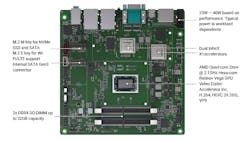Dual AI Accelerators Fuel Mini-ITX Motherboard
This video is part of TechXchange Talks.
What you’ll learn
- What is the InferX Hawk?
- Why is a mini-ITX motherboard significant?
The Flex Logix InferX Hawk (see figure) is a mini-ITX motherboard designed for applications that need machine-learning (ML) and artificial-intelligence (AI) acceleration.
In the video, I talked with Flex Logix's Barrie Mullens about why they built the motherboard and where it can be used, which includes applications like video surveillance or assembly-line quality-control systems.
The motherboard runs a quad-core, AMD Zen+ host processor with a Radeon Vega GPU and video codec accelerator. However, the ML/AI chores will be relegated two Flex Logix InferX X1 accelerators. These can be used individually or in tandem.
The InferX Hawk handles up to 32 GB of DDR4 SO-DIMM memory. The M.2 M key targets NVMe SSDs, while the M.2 E key socket can be used with peripheral interfaces like wireless adapters. Peripheral connections include dual DisplayPort sockets, two GbE sockets, two serial ports, plus five USB ports for USB 2.0, 3.1, and 3.2 (Type-C) connections. The system consumes 25 to 40 W of power depending on the workload.
The InferX X1 accelerators are what sets the motherboard apart. The accelerators host multiple single-dimensional Tensor processors that can be configured to manage two- and three-dimensional tensors. The processors support a high-precision Winograd acceleration option that increases system utilization and overall efficiency.
Unlike many other AI chips, these incorporate embedded FPGA (eFPGA) logic for customization. There's lots of on-chip memory, and it incorporates reconfigurable fabric so that intermediate results can be kept locally, helping improve performance.
Among the software support is Flex Logix’s EasyVision. It includes pretrained and preconfigured models for video applications such as face-mask and license-plate identification. Other models check for PCB defects and and another performs battery inspection. The EasyVision models work with Flex Logix's InferX Model Development Kit (MDK) and the Run Time Kit (RTK).
Check out more videos in TechXchange Talks.

